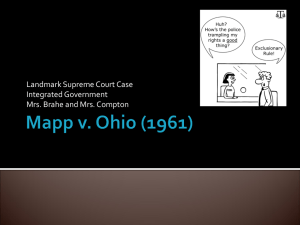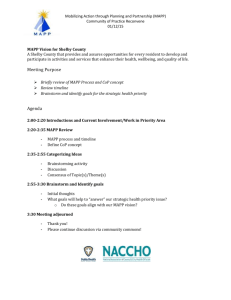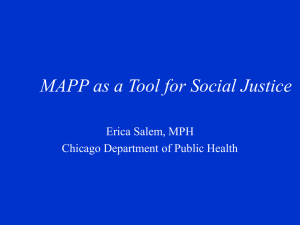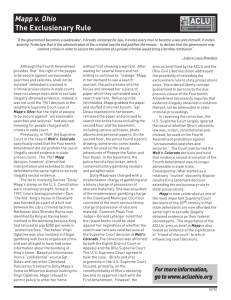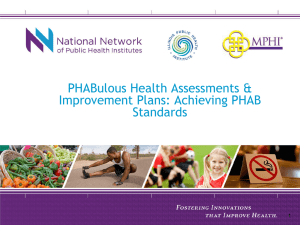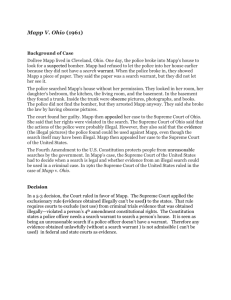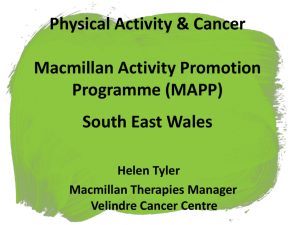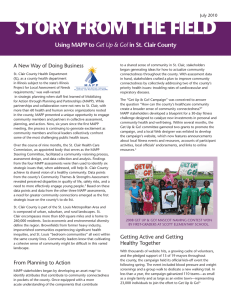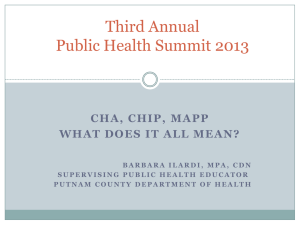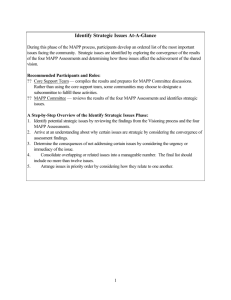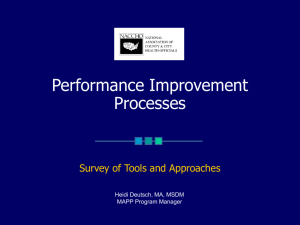2013_0419_MAPP_Overview_Kansas
advertisement
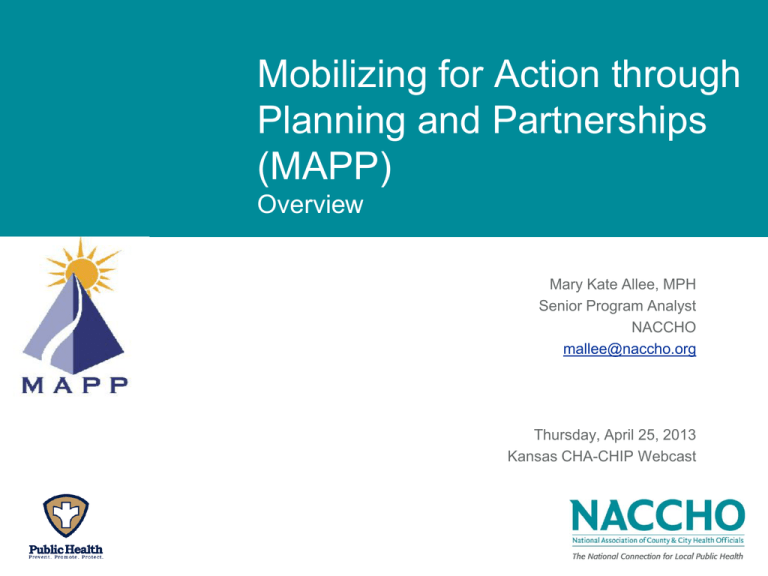
Mobilizing for Action through Planning and Partnerships (MAPP) Overview Mary Kate Allee, MPH Senior Program Analyst NACCHO mallee@naccho.org Thursday, April 25, 2013 Kansas CHA-CHIP Webcast There’s little worse than doing the wrong thing better and better. - John C. Johnson By the end of this presentation participants will be able to describe: 1. Why MAPP is a long-term, system-wide paradigm shift in public health practice; 2. The six phases of MAPP; and 3. Where to find MAPP resources. MAPP is… • A community-wide strategic planning process for improving public health. • A method to help communities prioritize public health issues, identify resources for addressing them, and take action. M.A.P.P. • Mobilizing: Engaging the community • Action: Implementing a health improvement plan • Planning: Applying strategic planning concepts • Partnerships: Involving local public health system and community partners The MAPP Paradigm Shift Three Keys to MAPP • Strategic Thinking • Community Driven Process • Focus on the Local Public Health System 8 Organize for Success/Partnership Development Plan a MAPP process that • Builds commitment • Engages participants • Uses participants’ time well • Results in a plan that can be successfully implemented Visioning Vision and values statements provide • focus • purpose • direction The Four Assessments • Forces of Change • Local Public Health System • Community Themes & Strengths • Community Health Status Community Health Status Assessment • Health status • Quality of life • Risk factors Community Health Status Assessment 11 Categories of Data • Demographic Characteristics • Socioeconomic Characteristics • Health Resource Availability • Quality of Life • Behavioral Risk Factors • Environmental Health Indicators • Social and Mental Health • Maternal and Child Health • Death, Illness and Injury • Infectious Disease • Sentinel Events Community Themes & Strengths Assessment Identifies • Themes that interest and engage the community • Perceptions about quality of life • Community assets Warren County, NJ Local Public Health System Assessment Measures the capacity of the local public health system to conduct essential public health services Local Public Health System Transit HCP Employers Civic Groups Faith Institutions Law Enforcement Mental Health EMS Elected Officials Parks and Rec Dentists Tribal Health Public Health Drug Treatment NGOs Labs Fire Corrections Home Health CHCs Neighborhood Groups City Planners Nursing Homes Schools My Dog is Mad. Don’t Ever Let An Event Rise. 1.Monitor health status to identify and solve 6.Enforce laws and regulations that protect health community health problems. and ensure safety. 2.Diagnose and investigate health problems and 7.Link people to needed personal health services health hazards in the community. and assure the provision of health care when 3.Inform, educate, and empower people about otherwise unavailable. health issues. 8.Assure competent public and personal health 4.Mobilize community partnerships and action to care workforce. identify and solve health problems. 9.Evaluate effectiveness, accessibility, and quality 5.Develop policies and plans that support of personal and population-based health services. individual and community health efforts. 10.Research for new insights and innovative solutions to health problems. Forces of Change Assessment Identifies forces that are occurring or will occur that will affect the community or the local public health system Forces of Change Assessment Focuses on issues broader than the community including: • Uncontrollable factors that impact the environment in which the LPHS operates • Trends, legislation, funding shifts, politics, etc. Identify Strategic Issues Strategic issues are fundamental policy choices or critical challenges that must be addressed in order for a community to achieve its vision. Formulate Goals and Strategies • Form goal statements related to strategic issues • Identify strategies for achieving goals The Action Cycle • Plan • Implement • Evaluate MAPP as a Framework Organizational or Community Visions Hospital CHNA Qualitative data on Community Perceptions Priority Areas Strategies Pubic Health Activities MAPP Tools & Resources • MAPP Website (www.naccho.org/mapp) • Clearinghouse • The MAPP Network (mappnetwork.naccho.org) • Trainings & Presentations • MAPP Field Guide • MAPP Users Handbook • NACCHO Staff (mapp@naccho.org)

